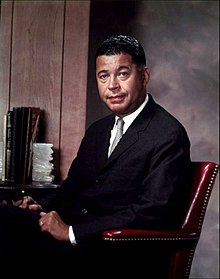Edward Brooke
Edward William Brooke III (* 26. October 1919 in Washington, DC , † 3. January 2015 in Coral Gables , Florida ) was an American politician of the Republican Party . From 1967 to 1979 he sat for the US state of Massachusetts in the US Senate , making him the first popularly elected African-American US Senator.
biography
Brooke was born in Washington, DC to Edward William Brooke, Jr. and Helen Seldon. He was the middle of the couple's three children. He attended public schools in Washington and Dunbar High School , one of the most prestigious high schools for African Americans in the federal capital. He then decided to study human medicine , but soon switched to social sciences . In 1941 he finished his studies. Immediately after the attack on Pearl Harbor, he enlisted as a soldier in the United States Army . There he served in Italy during the Second World War , where he also met his future first wife. In 1945 Brooke, who last served in the rank of captain , retired from active service. He was awarded the Bronze Star during his military service .
After his return to the United States, Brooke enrolled for a new course, this time law at Boston University . In 1948 he successfully completed his studies. In 1950 he ran in the Republican and Democratic primary for a seat in the Massachusetts House of Representatives . He was able to win the Republican area code, but he was unable to prevail in the main election, building a future for himself with the Democrats traditionally strong in Massachusetts. From then on he ran for two more Republican elections, but failed to prevail on both occasions. He narrowly lost the election to Secretary of State . The Massachusetts Republican leaders became aware of Brooke. Governor John Volpe named him chairman of the Boston Finance Commission , where Brooke made a name for himself. There he was responsible for uncovering financial irregularities and corruption in the Boston city government. In 1962, Brooke successfully ran for Attorney General of Massachusetts. He was the first African American to take this post in a US state. Brooke was also able to distinguish himself in this position, among other things in the fight against organized crime. The fall of Albert Henry DeSalvo , who made headlines as the Boston Strangler , also fell during his tenure . In 1965 Brooke was elected to the American Academy of Arts and Sciences .
In the 1966 Senate elections , Brooke ran for the seat of the no longer-running Leverett Saltonstall . He was able to prevail against Endicott Peabody and was the first African American to be elected by the electorate after the passage of the 17th Amendment to the Senate. Among other things, he was a member of the United States Senate Committee on Banking, Housing, and Urban Affairs . In 1972 Brooke was re-elected, making him the first African American to do so. In 1978 he had to admit defeat to Paul Tsongas and resigned from the Senate in 1979.
After leaving the Senate, he worked as a lawyer in Washington, DC. On June 20, 2000, the Edward W. Brooke Courthouse , a courthouse in Boston, was named after him. In 2002 he was diagnosed with breast cancer. After receiving the diagnosis, he supported several campaigns raising awareness of the rare disease in men. On June 23, 2004, he was awarded the Presidential Medal of Freedom by US President George W. Bush . On October 28, 2009 he received the Congress Gold Medal of Honor . Brooke died on January 3, 2015 at the age of 95 in Coral Gables, Florida, where he had lived with his second wife to the last.
Web links
- Edward Brooke in the Biographical Directory of the United States Congress (English)
- Edward Brooke in the database of Find a Grave (English)
Individual evidence
- ^ Douglas Martin: Edward W. Brooke III, 95, Senate Pioneer, Is Dead. In: The New York Times, January 3, 2015 (accessed January 4, 2015).
| personal data | |
|---|---|
| SURNAME | Brooke, Edward |
| ALTERNATIVE NAMES | Brooke III, Edward William (full name) |
| BRIEF DESCRIPTION | American politician (Republican Party) |
| DATE OF BIRTH | October 26, 1919 |
| PLACE OF BIRTH | Washington, DC |
| DATE OF DEATH | January 3, 2015 |
| Place of death | Coral Gables , Florida |


